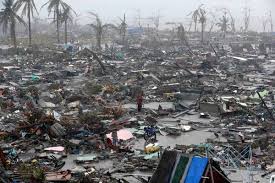There is a Pink Floyd song entitled ‘Comfortably Numb’. It is about medicating yourself presumably, about drugs to dull the pain of existence. Of course it could be about the use of novocaine during oral surgery so you will be ‘comfortably numb’ before the drilling. But I want to talk about the effect of the total bombardment from the media in their coverage of one world disaster after another, after another.
What happens is after a while there is what is called ‘compassion fatigue’. Sometimes this is just narcissism– ‘it didn’t happen to me or my loved ones, so it doesn’t matter’ or ‘it didn’t happen in America, so it doesn’t much matter’.
But sometimes the sheer scale of a disaster is so great that it seems impossible that there could be an adequate response. A good example of this is what happened last month in the Pacific to the Philippines when the largest typhoon ever devastating the country made up of 7,000 island (see picture above). Thousands were killed, hundreds of thousands of home destroyed, danger of the rapid spread of diseases like cholera. No clean drinking water. This disaster makes what happened to New Orleans with Katrina look like the rain out of a picnic, no exaggeration. If what happened in the Philippines happened here in the U.S. we would be talking about it for decades, and responding to it for an equally long period of time.
Now perhaps you don’t much believe in climate change. You don’t much believe in global warming. You think that these things go through cycles, and its just an accident that now the natural disasters seem to come on a grander scale. You would be wrong about this, but whether you are or not, my question in this post is how should Christians respond to such world-scale disasters?
My first and main point is simply this– Christians should respond on the basis of first principles. What I mean by this is that we should respond out of preparedness and for positive reasons, not for negative ones. Too often responses to crisis are based on an emotional reaction to dramatic pictures or stories. What happens is a temporary feeling of compassion, and one responds, sometimes even responds quickly. When the feeling goes away, the response fades quite rapidly.
For example, a major news outlet tells a story of sex trafficing of young girls in places like Cambodia or Thailand. People get upset, their moral outrage goes far enough to write a Congressman. The politician responds and says they will work on it. And….. nothing much gets done. The ugly abuse of children continues.
If you respond on the basis of what is stimulating your emotions now, or stirring up guilt feelings that you have not been very compassionate up to that point, then the response will never be adequate. The feeling will fade, and the next news cycle will present you with the next disaster d’jour, and before you know it, you experience a very different feeling— compassion fatigue, or better said feeling ‘comfortably numb’.
It is precisely because of all this that Wesleyan or Methodist Christians have set up vehicles, organizations, quick response capabilities so that on an ongoing basis Christians can be ready when one kind of disaster or another strikes. John Wesley said that there can be no spiritual holiness without social holiness, and he was right. The church is supposed to be the hands and feet of Jesus helping the poor, the abused, those devastated by disaster.
It was this commitment on principle (not as a knee jerk emotional response to a particular crisis) that spawned :1) the Salvation Army; 2) Goodwill Industries; 3) Hull House; 4) the Red Cross; 5) UMCOR (the United Methodist Committee on Relief). The latter gives 98% on every dollar to overcoming this or that crisis, like the one in Haiti. No other relief agency, especially no secular one I know of, does that. It’s because our church picks up the expenses tab, so that what Methodists give for relief goes directly to relief. Yes it is true, Methodists had something to do with, or indeed were the main reasons why all of those named groups above were established. And this was part of our response of Jesus telling us we needed to continue to extend his works of compassion and mercy and healing to even the least, the last, and the lost. It’s one of the reasons I am proud to be a Methodist.
My question for you during this Advent season is— How is your church doing with the ongoing, long term committed first principles dealing with disasters, including those which do not happen in your backyard, and which you in no way are responsible for causing?? Does your church do anything other than occasionally organize a few people to go help with ‘Katrina relief’ or the like? Has it set up any structures, any organizations whose designated purpose is the ministries of compassion and healing? If not, why not?
What I am prepared to say is that if you are only committed to the ‘spiritual’ Gospel and things like verbal evangelism, then you are only committed to half a Gospel, not the whole Gospel.
When Julian the Apostate was Emperor of the Roman Empire, at one juncture he wrote a letter to the priests who ran various of the pagan temples around the Empire. He wrote complaining that the temples were increasingly being abandoned, and that people were beginning to flock to the churches which kept growing on his watch. He complained that because the church was feeding the poor, clothing the naked, finding shelter for the homeless, protecting the orphans and widows, and the like that people were changing their religion. Christians in 3rd-5th centuries A.D. were not responding to news media coverage of this disaster or that. They were not responding ad hoc to the crisis d’jour. No, on the basis of what they understood it meant to offer the whole Gospel to the whole world, they had set up ongoing means to meet human needs. And they were quietly getting on with it, and the results were that many more people were coming to Christ. Julian moaned, ‘look how those Christians love one another’. I don’t hear that complaint much made about American Christians these days.
Think on these things in a Christmas season where every day we see an orgy of self-indulgence, Christians buying a million presents to give to ourselves or our immediate families, who in too many cases, already have too many material possessions. Did Jesus, born in a manger, come into this world to bless our conspicuous consumption, our narcissism, and call it good? I don’t think so. What do you think?














